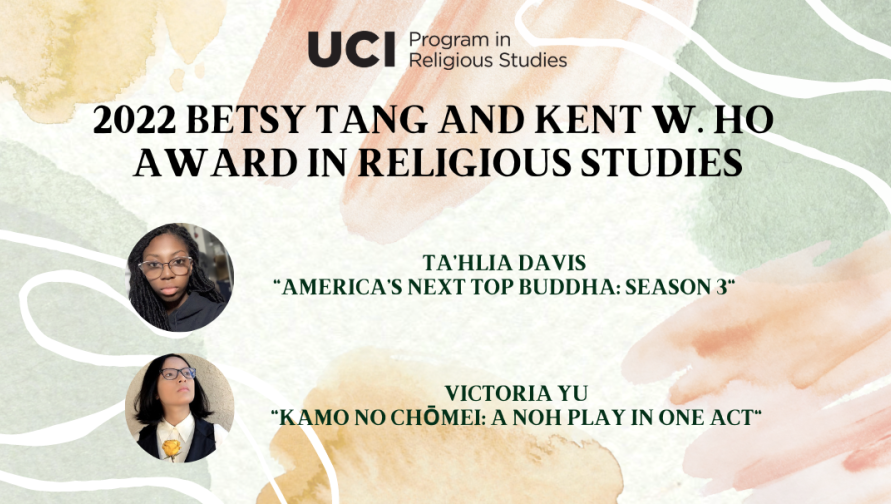
Ta’hlia Davis
Essay Title: America’s Next Top Buddha: Season 3 (Click here to read the full essay.)
My name is Ta’hlia Davis and I am a rising 3rd year at UC Irvine. I am currently pursuing two Bachelors degrees, one in International Studies and the other in East Asian Cultures. I also have two minors, Creative Writing and Japanese. My academic interests largely concern humanitarian issues, comparative international governance, and foreign affairs and diplomacy.
Victoria Yu
Essay Title: Kamo no Chōmei: A Noh Play in One Act (Click here to read the full essay.)
Hi, I'm Victoria! I enjoy strong cups of tea, and the arts. One day I'll go to Japan, and work to cross cultural boundaries. Please enjoy this poem I wrote!
まめなしが あめのやうに散る 世のすべて
四季に咲きつつ 遥遥に舞へ
Callery pear petals scatter like rain,
Blooming in all four seasons,
Knowing everything in the world.
Dance forward, into the distance!
It was a great pleasure to select essays by Ta’hlia Davis and Victoria Yu from an abundance of excellent work submitted by the students of Japanese Buddhism (EAS 116; Spring Quarter 2022) for the Betsy Tang and Kent W. Ho Award in Religious Studies. Each time this course takes place, students are challenged with the project of writing a debate between two or more major Buddhist figures from Japanese history. For this they have freedom to choose the setting as well as the doctrinal topics to be debated.
Buddhism, in almost every culture in which it has been practiced, has involved doctrinal debates as part of its monastic practices. These functioned as education and as display of scholarly finesse, and often involved creative responses. Perhaps the most succinct form – if it can be called a debate – is the well-known Zen koan, a paradoxical question presented to a monk by his or her teacher, designed to alter the mental processes normally employed to consider a problem and to evoke a response that demonstrates an enlightened understanding. Other debates were large-scale ceremonial affairs. Yet others, we find in less official form in letters exchanged between monks or conducted in the context of political power.
The students of this year’s class more than delivered on the prompt, with astonishingly creative presentations of debates as, among others, therapy sessions, classroom discussions, TV shows, podcasts, fundraising events, casual conversations at Buddhist festivals, and supernatural encounters, and they embedded these in an academic paper format, drawing on their learning and research. The awardees of this year’s honor, chose to situate their debates in, respectively, the formats of a TV show and a Noh play, which we publish here.
Victoria Yu adopts the genre of the traditional Noh play, one of the oldest of Japan’s theatrical forms, in which to cast her debate, skillfully using the poetic form that characterizes its scripts, as well as displaying a mastery of its plot-form, style, and idioms. However, her matching of the figures of Shinran and Kamo no Chōmei is original, and builds in part on her studies in literature and theater in the East Asian Studies Department at UCI. She also draws in references to figures of Indian Buddhism – Vimalakīrti and Shakyamuni, along with Buddhist beliefs (impermanence, incarnation, the skandhas, no-self). She explores these as they developed in Japan (Amidism, The Age of Degeneracy, issues of marriage) well reflecting her knowledge of the subjects. Not only is her knowledge exhibited but her understanding as well. Shinran and Kamo no Chōmei, put into dialogue with each other, must clarify and justify their views, and these she depicts with facility, and in the beautiful setting and style of a play complete with stage directions and dance choreography.
Ta’hlia Davis presents her debate ingeniously in the format of an episode of “America’s Next Top Buddha” and she sets four Buddhist figures into conversation with each other: Shakyamuni Buddha, Amida Buddha, and the priests Shinran and Kūkai, along with a crew of Zen cameramen who cannot resist applying their wabi-sabi aesthetics to the production. This entertaining episode script is replete with references to Buddhism and its varieties in Japanese history - supported by numerous citations and footnote clarifications – many of them laugh-out-loud funny, and all of them smoothly woven into the dialogue. In contrast to the figures in Yu’s essay, Davis’s speak colloquially to comedic effect, which is also very accessible to the reader, whether familiar with the material or not. The contestants are challenged with questions concerning understanding of the reality of the Pure Land, and critiques of it by Zen figures; the place of women in Japanese Buddhism; the function of karma; and the Eightfold Path. As a whole, it is a brilliant, well-informed, and creative presentation of some of the most vital principles of the various sects of Japanese Buddhism, complete with portrayals of its major figures as fundamentally very human.
Congratulations to the awardees of the Betsy Tang and Kent W. Ho Award in Religious Studies.
By Elizabeth Tinsley, Assistant Professor of East Asian Studies
